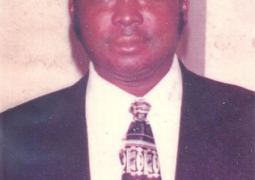"Who is there to oppose or frustrate us if only we have the courage to form an All African Union Government? Can the industrialised countries do without our copper, our uranium, our iron or our bauxite, our coffee, cocoa, cotton, groundnut, palmoil or will they be coming, running to us as we have been running to them for trade on equitable terms? It is courage that we lack not wealth!"
These were the words of Halifa Sallah, the Director of the Peoples Centre for Research and Social Sciences, and a Pan-Africanist on the occasion marking Africa Liberation Day yesterday.
The event, which was held at the Gambia College Auditorium was organised by the Social Science students of the University of the
Mr. Sallah, who was invited as the main speaker, explained that Kwame Nkrumah told the African leaders in 1965, which was his last summit, that "everywhere in
Today, he added, African countries are classified as the least developed countries, highly indebted poor countries requiring assistance for debt relief.
After the crisis of
Nkrumah was sincere when on the 6th of March 1957, he declared that "the liberation of
"Nkrumah told the leaders that none of us can stand alone. We will remain in that condition until we take the economic and political destiny of
The erudite Gambian-born Pan-Africanist added that Dr. Kwame Nkrumah has transformed
According to Mr. Sallah, Nkrumah was not full of idealism, but was very realistic. He said this is the challenge that we need to interrogate today. Was he realistic? Is talking about African unity a dream, a panacea, or something inevitable? This, Sallah said, is what we must all interrogate to know.
According to him, many people classified Nkrumah as an idealist, a person who was not realistic, who was merely building castles in the air, who was interested in prestigious projects which ultimately led to the devastation of
However, Sallah went on, what Nkrumah said was that as far as he was concerned, the secretariat of the African Union shall be a secretariat of the executive council making recommendations. In pursuit of this objective, he said, time has come for the African Union to create and develop three essential machineries for African unity.
These are an African Common Market to serve our expanding economies, an African High Command which can defend our continent and ensure the security of the member states, and an Executive to co-ordinate and harmonise the efforts of all African states on African basis.
In the view of Nkrumah, as narrated by Halifa Sallah, regional integration is not the solution for African unity.
"We have people mentioned regional integration, and some claimed that regional integration is what is going to lead to African unity." Kwame Nkrumah said 'No!' Regional integration is not the building-block for African unity. That's what he told them in 1965. He reminded the leaders of what happened in 1963," he explained.
Following
He said by December of that year, Kwame called for the All-African Peoples Congress, where all liberation movements, including the leaders attended the conference to strategise on how to promote the liberation of the African continent.
The reason why 1960 is called the "Year of liberation", according to the renowned Gambian sociologist, is that this was the year when 17 African countries became independent, including
He said the Belgians were selfishly relying on
"So, there is absolutely no doubt that the emergence of the African continent was based on power being given to its leaders by the people," he declared.



